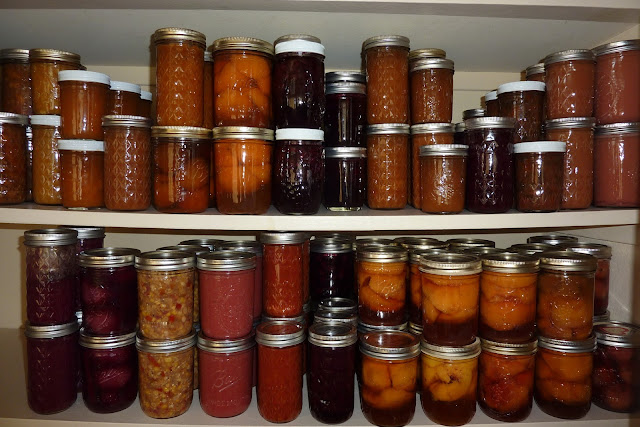Lisa Bunin, PhD, of the Center for Food Safety explains, “When you eat organic,
you can feel confident that you are contributing to a better world by supporting farmers
and farming practices that steward the fertile land upon which a secure food future depends.”
The organic policy director explains that the impact of choosing to purchase and eat organic foods
not only benefits our bodies, but also nourishes soil, conserves water, restores ecologic diversity,
and protects the health of farm workers and communities.
As such, Lisa supports the take-home message of
Maria Rodale’s book Organic Manifesto:
“If you do just one thing—make one conscious choice—
that can change the world, go organic.”
from The Cultivator, September 15, 2015
 |
| NonGMO Top Hat corn pollinated by Anasazi corn. |
 |
| Pimento peppers from MuRefuge seeds. |
 |
| Not only stunning, but tasty too, Anasazi corn. |
 |
| Relish made with Pimento peppers and Anasazi corn |
grown at MuRefuge is grown in soil that has been regenerating for some 20+ years now. The vegetable beds get compost from our compost bins on a regular basis as well as comfrey tea made right here at MuRefuge.
When one eats out or buys one's food, what is in the food is often unclear and the source of the food often a mystery. We are so fortunate here in Sonoma County to have not one but two places to eat out where the source of the food is clearly identified. Peter Lowell's in Sebastopol has been open since October, 2007 serving organic food which is sourced from local farms. I simply love their Italian like pizza cooked in their brick oven. The second restaurant has been more recently opened a few years ago and is located in Forestville, a short jaunt North on Highway 116 from MuRefuge. The Backyard is unique in that it sources its food from farms West of Highway 101, totally in The West County (of Northern California's Sonoma County). For brunch they offer duck eggs as an alternative to chicken eggs which my body is unhappy to have ingested. My latest anti-agribusiness stance: we not be consuming feedlot meat nor sludge fed vegetables.
Shopping for food at the Sebastopol Farmers Market is a delightfully social event for me. Talking to the farmers about their practices is always fun and enlightening. The two vendors I buy most regularly from are Singing Frogs Farm and The Patch that is owned and farmed by a knowledgeable Mexican man. Not only are the vegetables grown at these farms more tasty, the qi is obvious. What vegetables I choose to buy to augment the abundance from right here at MuRefuge is informed by moderation and seasonality. I do not buy kale every week and with good reason if you check out the information now available about kale and her relatives.
From my point of view, Americans have become passive about food, accepting the new and latest fade and/or "the spin" put on what is good for us. Often what passes as food is not real food but rather processed beyond recognition. During a visit to an organic vegetable garden the children were asked to name a vegetable they liked and one child answered, "spaghetti." "Yikes!" I thought when I heard this.
So I was ever so delighted while attending the Soil Not Oil conference in Richmond, to hear from so many of the young adults sharing their "work" to bring attention not only to
regeneration of the soil but also to the nutrient deficient food produced from our depleted soil (not to mention the lack of life giving qi). Others shared their concern for the masses consuming processed food created by the megacorporations that support agribusiness in their toxic approach to soil depletion and offered examples of solutions practiced by this energetic, focused 20's and 30's generation. These young people are acting to reverse the time bomb (climate change) created by their forefathers.
One of the Plenary II speakers was a young woman from Mexico, Adelita San Vicente Tello, who is protecting Mexican corn against GMO manipulation. She shared that corn is an "invention of ours and corn invented us" since corn has been grown in her native country for over 8000 years. Using Dr. Vandana Shiva's mentorship, in 2009, she organized legal action to halt corporate ownership of corn and asked for respect of our right to what is ours. Of course, the big corporations pushed to stop the legal action. Mexico's opposition to GMO corn is the biggest effort of any country worldwide.
Claire Hope Cummings, an environmental/native land rights lawyer and journalist, encouraged everyone in the audience to consider "an inconvenient truth versus a reassuring lie." She talked of industrial agriculture creating both human and natural catastrophe in the not so distant future. Industrialized agriculture is dehumanizing, while the land is more productive when people "farm" as "family". She shared her view that storytelling that nurtures both humans and the land has great power to shift one away from the "reassuring lies" of industrial agriculture. Her most poignant example was the story of Skywoman appearing in Robin Wall Kimmerer's Braiding Sweetgrass. Regenerative agriculture brings forth a commitment to nature as well as laughter she stressed. Also, she reassured the audience that "science" is on our side. Check out IAASTD for more on this.
"We abuse the land because we regard it as a commodity
belonging to us. When we see land as a community to
which we belong, we may begin to use it with love
and respect."
Aldo Leopold, A Sand County Almanac (1949)
And everyone sharing my table for Plenary III knew Vani Hari, aka Food Babe. Her story of moving from ill health to recovering her vibrancy struck a cord with me. This first generation Indian whose parents moved from India to this country so her father could continue his college studies ate from infancy processed American food as her father mandated. Reaching young adulthood in a very debilitated and robot like state, she set out to discover what exactly was in the food that everyday Americans ate. For example she discovered that the US Kraft's mac 'n cheese had toxic additives, but not so with that product sold and eaten in Britain. Through initiatives started on her blog she has successfully altered what big companies put in their food or what kind of food they buy. Did you hear that McDonald's, who uses one-third of all eggs produced in this country, is going with cage free eggs and Chipotle is going with organic meat? If we the people step out of our trance and speak up, we can make a difference.
 |
| MuRefuge's pantry filled with the abundance from her three quarters of an acre. |




